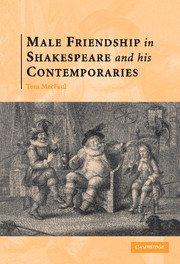Book contents
- Frontmatter
- Contents
- Acknowledgements
- Note on the text and list of abbreviations
- 1 True friends?
- 2 Momentary mutuality in Shakespeare's Sonnets
- 3 Friends and brothers
- 4 Love and friendship
- 5 Servants
- 6 Political friendship
- 7 Fellowship
- 8 False friendship and betrayal
- 9 Conclusion: ‘Time must friend or end’
- Notes
- Bibliography
- Index
9 - Conclusion: ‘Time must friend or end’
Published online by Cambridge University Press: 22 September 2009
- Frontmatter
- Contents
- Acknowledgements
- Note on the text and list of abbreviations
- 1 True friends?
- 2 Momentary mutuality in Shakespeare's Sonnets
- 3 Friends and brothers
- 4 Love and friendship
- 5 Servants
- 6 Political friendship
- 7 Fellowship
- 8 False friendship and betrayal
- 9 Conclusion: ‘Time must friend or end’
- Notes
- Bibliography
- Index
Summary
In Troilus and Cressida, Pandarus tells his niece that ‘time must friend or end’ (i. ii. 77–8). This proverbial cliché means little in context, but has some resonance. Idealized and, as we have seen, imaginary perfect friendship is seen as permanent. In dramatic plots, however, friendship is presented as fleetingly impermanent, fragile, illusorily existing in the moment; its value is only fully recognized when it has passed. To be fully realized in a plot it must end. Iago's final silence is the ultimate closure of friendship. He has won his place in the story, but in doing so he has cancelled himself out.
Shakespeare's plays show the dependence of even the most apparently self-sufficient individual on other people. Just as the great tragic actor needs bit-part players to focus attention on him and to enable the emergence of his full dramatic range, so the most central character needs his friends and others to situate him in the drama of his life, and to bring out all the harmonics of his selfhood. Louis MacNeice, in his Autumn Journal, put this better than anyone:
Aristotle was right about the Alter Ego
But wrong to make it only a halfway house:
Who could expect – or want – to be spiritually self-supporting,
Eternal self-abuse?
Why not admit that other people are always
Organic to the self, that a monologue
Is the death of language and that a single lion
Is less himself, or alive, than a dog and another dog?
- Type
- Chapter
- Information
- Male Friendship in Shakespeare and his Contemporaries , pp. 196 - 197Publisher: Cambridge University PressPrint publication year: 2007



